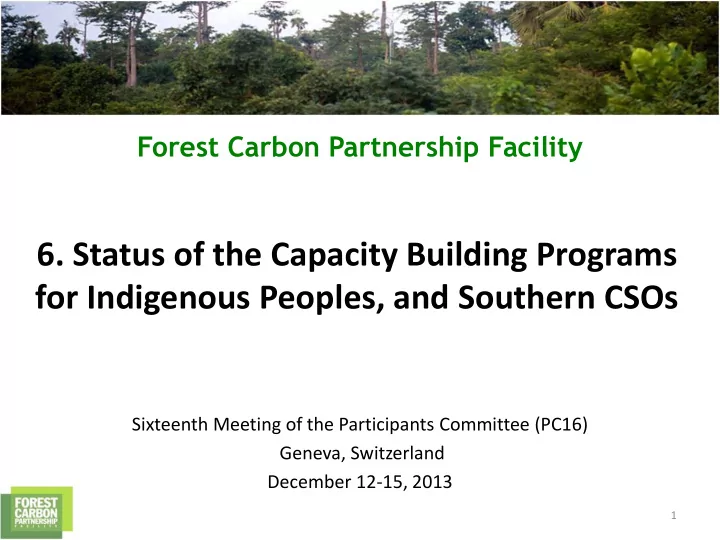

Forest Carbon Partnership Facility 6. Status of the Capacity Building Programs for Indigenous Peoples, and Southern CSOs Sixteenth Meeting of the Participants Committee (PC16) Geneva, Switzerland December 12-15, 2013 1
Overview • Review of Capacity Building Program (First Phase FY09-13) o Facts and Figures o Case Examples • Progress on Transition to New Grant System for FY14-15 o Regional Intermediaries Workshop o Preparation Steps 2
Background • Dialogues with IPs/CSOs confirmed the need to enhance the support for capacity-building • First CB program for Indigenous Peoples was approved by PC1 in October 2008, and amounted to $1 000 000 for 5 years • PC10 approved upscaling the resources for the program ($3.99 Mill. in grants for FY12-15) and expand it to include Southern CSOs. 3
Financial Overview Disbursements FY09-11 Budget FY12-13 Approved Grants FY 12-13 Disbursements FY12-13 Disbursements FY14Q1 IP Asia 138,545 231,579 130,000 36,000 35,000 IP Africa 173,948 358,396 160.000 35,000 96,000 IP Latin America 235,161 340,476 278,680 130,195 25,000 IP Total 547,654 930,451 568,680 201,195 156,000 CSO Asia 0 188,421 219,168 71,920 0 CSO Africa 0 291,604 384,810 7,000 0 CSO Latin 0 277,024 246,520 0 28,000 America CSO Total 0 757,049 850,498 78,920 28,000 Total 547,654 1,700,000 1,419,178 280,115 184,000 4
Patterns and Trends • Since inception of the capacity-building program, 29 grants (14 Latin America, 7 Africa, 6 Asia, 2 for global activities) have been approved. • Approval of 15 grants in FY13 alone shows rapid up- scaling. • CSO grants have increased steadily (7 in FY13) • Supported activities have evolved from awareness- raising workshops/training manuals to more “technical” capacity -building 5
Telapak: Indigenous Peoples Database Indonesian NGO consortium Telapak developed web database of indigenous and customary forest territories as an input to REDD+ Readiness. Particularly important in light of the recent Supreme Court decision on customary forest tenure. 6
PACJA: Preparing for REDD+ Regional project in East Africa, managed by the Pan African Climate Justice Alliance, focuses on developing capacities for meaningful participation in REDD+ environmental and social safeguards reviews and the development of grievance redress mechanisms. 7
OJEWP: Mapping Carbon Resources This recent project, implemented by the Organización de Jóvenes Embera Wounaan de Panamá , combines local knowledge and modern imaging technologies (LiDAR) to enhance capacities for participatory carbon monitoring in indigenous territories. 8
New Phase FY14-15 9
Regional Implementing Organizations 10
New Phase: Progress Update I Project Development: Project concept developed and discussed with regional implementers at workshop in early September, in Washington, DC. • Agreement reached on the eligibility criteria as well as the illustrative list of topics and themes, as captured by the draft concept note. • Implementation modalities will include support for community- level projects through sub-grants, direct work programs at national/sub-regional levels, or a combination of the two. • Participants trained on procurement, financial management and safeguards aspects of recipient-executed trust funds. 11
New Phase: Progress Update II • Concept Review: To be held in early January, with agreement reached on broad objectives and activities of program. • Country No-objection: Templates sent to REDD+ Countries through World Bank Country Directors to ensure buy-in at country level. • Due Diligence: All Integrated Assessment Frameworks (IAFs) completed by grantees, with details on fiduciary and safeguards capacities. 12
Next Steps and Timeline • Due Diligence: World Bank review of IAFs for strengths and gaps in fiduciary and safeguards capacities of implementing organizations (12/13- 1/14). • Project Appraisal: Refinement and tailoring of project concept to priorities and preferences of grantees, and detailing of activities and benchmarks through Operational Manuals/Statements (1-2/14). • Drafting and Signing of Grant Agreements (2-3/14) 13
Thank You! Gernot Brodnig (gbrodnig@worldbank.org) http://www.forestcarbonpartnership.org/capacity-building-forest-dependent- people-redd-1 14
Recommend
More recommend